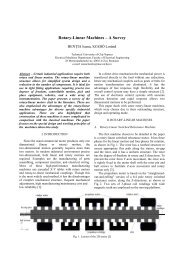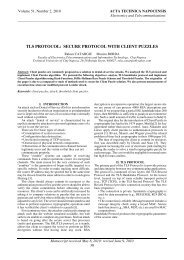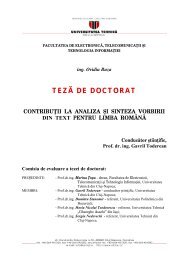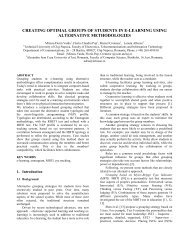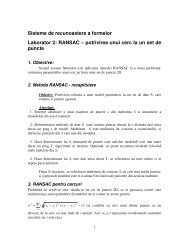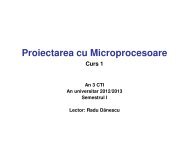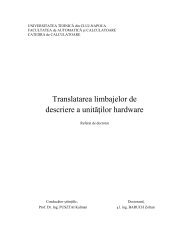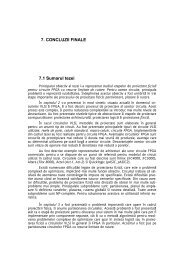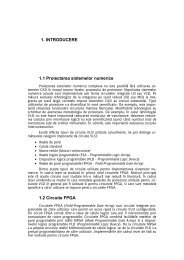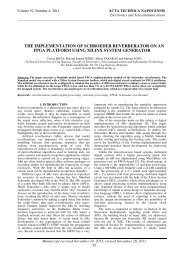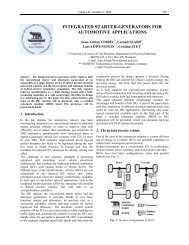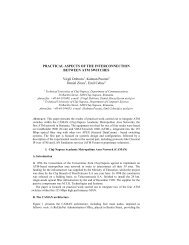LTE Emulator
LTE Emulator
LTE Emulator
Create successful ePaper yourself
Turn your PDF publications into a flip-book with our unique Google optimized e-Paper software.
<strong>LTE</strong> <strong>Emulator</strong> version 1.0 – technical report<br />
These thread computes the average bit rate on a specified time interval (see paragraph 3.1.2.<br />
dedicated to command and control block) and uses a timer with a 1s timing; the procedure<br />
associated to this timer displays this average bit rate and the evolution in time of this average<br />
value. The same procedure also computes the average delay per packet/second and displays the<br />
evolution in time of this value.<br />
The timing required by the generation of the instantaneous bit rate, meaning the generation<br />
of the TTI intervals, uses the high precision timer of the system, timer which can be accessed<br />
by the following functions [Que]:<br />
o „QueryPerformanceFrequency(*LARGE_INTEGER)” – gives the frequency of the high<br />
precision timer;<br />
o „QueryPerformanceCounter(*LARGE_INTEGER)” – reads the counter associated to<br />
this timer;<br />
3.2.1. Interception and filtering of the processed packets<br />
The solution used for implementation of the present emulator is based on interception of<br />
MAC Ethernet packets, approach that ensures independence of the higher-layer protocols. The<br />
packet-interception is accomplished by using the functions of the WinPcap [Wpc] library for the<br />
Windows operating system. The intercepted packets are stored in buffers managed by the<br />
WinPcap functions, their lengths being controlled from the user interface of the command and<br />
control block. This library also includes special functions for packet-filtering at the kernel level,<br />
facility used in the present implementation the decrease the processing time.<br />
The functions of the WinPcap library that are used in the present implementation are the<br />
following (for supplementary details see [Wpc]):<br />
int pcap_findalldevs (pcap_if_t **alldevsp, char *errbuf);<br />
- generates a list of network devices which can be open with the “pcap_open_live()”<br />
function; for each device it associates a “pcap_if_t” descriptor, which is a structure that contains<br />
information related to the network device that can access it; errbuf, is a string which contains a<br />
possible error message; the function returns 0 for successful operation and -1 otherwise;<br />
pcap_t pcap_open_live (const char *device, int snaplen, int promisc, int to_ms, char *ebuf);<br />
- generates a „packet capture descriptor” pcap_t ; this is a structure which contains data<br />
necessary to access a network device and to perform a packet capture; device – is the name of the<br />
accessed network device; snaplen – specifies the maximum number of captured bytes; promisc –<br />
specifies the functioning mode of the network device during the capture; to_ms – specifies the<br />
„read timeout” in ms;<br />
int pcap_sendpacket (pcap_t *p, u_char *buf, int size);<br />
- allows to send a “raw” packet (a full packet containing all the protocol headers, loaded<br />
in the packet by the sending application); the pointer p of type pcap_t describes the network<br />
interface and the capture process; buf – is the buffer which stores the bytes to be loaded in the<br />
packet (the entire structure of the packet excepting the CRC, which is computed by the network<br />
interface); size – length of the packet which will be transmitted;<br />
int pcap_next_ex (pcap_t *p, struct pcap_pkthdr **pkt_header, const u_char **pkt_data)<br />
- the function is used to capture the next available packet; pkt_header – is a pointer to a<br />
pcap_pkthd type structure, which contains the header of the captured packet, pkt_data – is a<br />
pointer to a string containing the data bytes of the captured packet;<br />
void pcap_close (pcap_t *p);<br />
- frees the memory and resources related to the packet capture process;<br />
int pcap_compile (pcap_t *p, struct bpf_program *fp, char *str, int optimize, bpf_u_int32<br />
netmask)<br />
11



